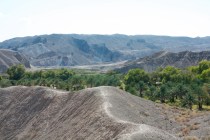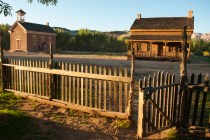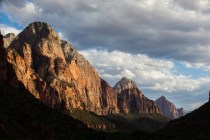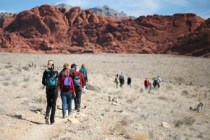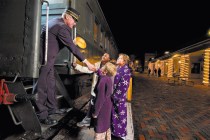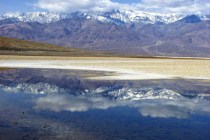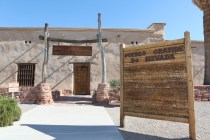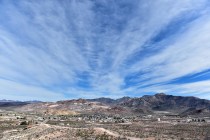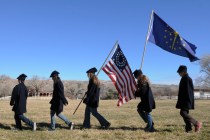Central Nevada state park preserves ghost town, fossil beds
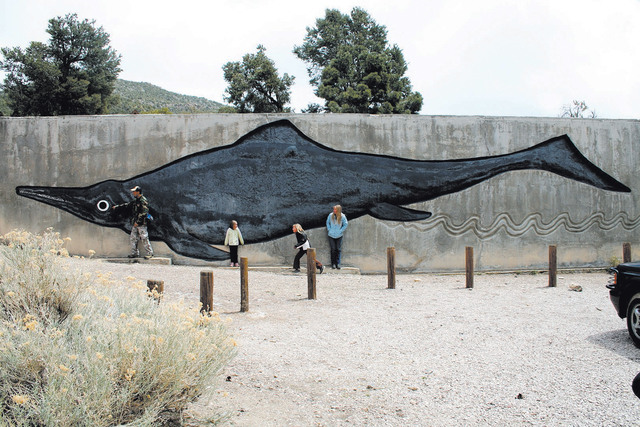
An early 20th century boomtown in Central Nevada, tiny Berlin is unique among the scores of ghost towns scattered across the Silver State. The former gold-mining center is the only Nevada ghost town to receive protection as a state park.
Created by the Nevada legislature in 1957, Berlin-Ichthyosaur State Park couples the abandoned 1890s boomtown with nearby fossils of huge marine reptiles, dating from the time of the dinosaurs, that were discovered near Berlin in the late 1920s.
The old town is listed on the National Register of Historic Places and the fossil beds are recognized as a National Natural Landmark. The listings underscore the importance of the resources protected in this remote 1,540-acre state park.
The ghost town stands as it was when the last residents left in 1911. Maintained in a state of “arrested decay,” its weathered buildings are included on a self-guided tour. Its Diana Mine is part of a ranger-guided tour on weekends from May through September. Not far from the old town, a roofed enclosure over the fossil beds is open for 40-minute guided tours daily during summer and on weekends in spring and fall.
Berlin-Ichthyosaur State Park sits in the foothills of the Shoshone Range about 340 miles from Las Vegas at 6,800 to 7,800 feet elevation. To reach it, head northwest on U.S. Highway 95 toward Hawthorne. At a junction near Luning, take state Route 361 through Gabbs to the turnoff onto state Route 844.
Stop to read park notices posted at this turnoff, including the most recent notice that there is no water available in the park this summer. Plan to bring a minimum of a gallon per person per day for your visit. The park access road heads east about 33 miles over a pass, across a sage-covered valley and up into wooded foothills. Summer visitors should bring jackets for cool nights, and winter visitors should expect snow.
The park entrance fee is $7, $5 for Nevada residents. Informational signs in town guide visitors on the free tour. People who want to take the mine tour should make reservations by calling 775-964-2440. A road runs from the town past a 14-site campground to the fossil shelter, where there is a free day-use area for picnicking. Guided tours of the mine and of the excavations inside the fossil shelter cost $3 for adults and $2 for children. Campsites are available on a first-come basis for an overnight fee of $17. Sites accommodate RVs up to 15 feet, but there are no hookups.
An easy nature trail, about a third of a mile long, connects the campground with the fossil shelter. Visitors who want to explore more while in the park should follow the road about a mile past the employee housing area to a trailhead into Richmond Canyon. Expect a hike of about 1½ miles with some altitude gain. Old roads run through the foothills and climb through passes, offering interesting side trips for those with four-wheel drive. Several old mining towns and camps dot the nearby landscape.
Mining in the area started with silver discoveries in Union Canyon in 1863, spawning camps such as Union, Ione and Grantsville. Berlin resulted from gold discoveries in 1869 and claims finally developed in 1898. The first Berlin miners occupied abandoned buildings in Union, by then a ghost camp. Interest in Berlin drew 250 residents in the early 1900s. In addition to mine and mill buildings, Berlin had homes, a general store, a post office, an infirmary, a union hall, a stage station, a barn and corrals and a sad little cemetery. But the town was doomed by 1909 and dead by 1911.
Residents departed, carrying what they could and leaving the rest behind in homes, stores and workshops. Visitors on the self-guided tour step inside a few buildings and peer through the windows of others, like peepholes into the past.
A large bas-relief at the fossil site shows what the whale-sized ichthyosaurs looked like when they hunted in ancient seas. Fossil remains of more than 40 prehistoric creatures have been found during sporadic excavations. The type of ichthyosaur found near old Berlin became Nevada’s official state fossil in 1984.
Margo Bartlett Pesek’s Trip of the Week column appears on Sundays.



